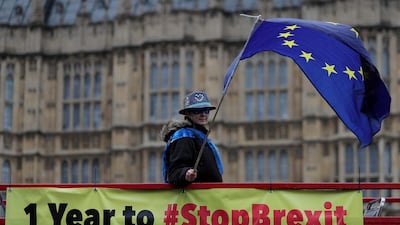So far the British effort to leave the European Union has resembled a danse macabre, but to avoid a harmful fall out for all sides the effort must take on a more collaborative tone.
There is a year to go until the break takes place in March next year. While it is unlikely that Britain's stern prime minister Theresa May would take inspiration from the frivolous dance song The Hokey Cokey that is exactly the spirit of Brexit she needs.
After famously declaring Brexit means Brexit, Mrs May staked her entire credibility on delivering a clean break between the UK and the EU. She travelled to the four corners of Britain last week, assuring all the constituent nations that London could make the process work in their interests.
It will be a difficult challenge. Within Britain there is a logic in Brexit becoming a centrifugal force that reverses the trend of decentralisation begun under Tony Blair. More obviously the country will need a new defining ethos, one that redefines Britishness.
With the issue of the Irish border looming so large over trade talks with the EU, it is also important to realise the bigger issue is the competition between Britishness and Irishness there. This will intensify within Northern Ireland. How that drama plays out will occupy policy makers for years to come.
In the next few weeks, Brexit trade talks will be at the forefront. There are only a few months to set up the future relationship as the shape of the deal must be clear by the end of June.
So why do I recommend Hokey Cokey? Because the key part of the song involves in steps and out steps.
In three big areas Mrs May must find a way to balance the departure with continued involvement: trade, security and finance.
Trade in goods between Britain and Europe moves freely under the single market. Important sectors such as manufacturers and agricultural businesses worry that a new trading regime will impose extra hurdles. In an era of just-in-time delivery, huge queues at ports represents a step backwards.
Component producers worry that the Jenga-like European manufacturing model could be hit by a Brexit-sized black hole when a transition period ends in 2020.
When it comes to security, Britain has made a big and generous offer. London wants to maintain a seamless fabric of co-operation with the Europeans. This not only means defence systems but also criminal policing and extradition activity plus also intelligence sharing.
Last week saw a set of anniversaries of the Brussels and Westminster terror attacks. The conversations, plot development and attack co-ordination within ISIL takes place across borders. So must work to defend the continent.
The week also saw European states join in a concerted move to expel Russian intelligence officials. This demonstrated the poisoning of a Russian man and his daughter in the English city of Salisbury was a challenge to all European states no matter what political disputes have raged.
But there will be points of departure. One important driver of the Brexit vote was a rejection of European efforts to establish an EU defence force. This so-called European army is a long way off but the remaining states will get more integrated in defence. Britain will necessarily be outside looking in. Massive joint ventures, such as Airbus and the Typhoon fighter jets, seem certain to be the last of their kind. Britain faces ejection from Europe's space race.
Banking is the other big area where collusion must continue. The eurozone is a far bigger area than the UK economy but it cannot simply replicate the London market overnight. London stands apart for a reason and the eurozone would be risking its own funding crisis by building barriers to the world’s largest financial market.
Projections on the loss of jobs in the financial markets as a result of Brexit now more often claim these jobs will migrate to the other global financial centres – New York, Hong Kong – than to the European contenders like Paris and Frankfurt.
When Joseph Nye came up with the concept of soft power, he defined it as a country’s ability to attract the interest of others. That is also the special magic of the City of London. It may be intangible but Mrs May must find a way to preserve this magnetic draw through the Brexit period.
The Europeans may now gamble that the eurozone can compensate and overcome loss of access (or simply more cumbersome ties) to London financial pools. It would be far more sensible to allow a rebalancing over time.
With the spirit of togetherness that underlies the Hokey Cokey, an ice-breaker on cruise ships for decades, the Brexit two-step can be done.
Even if, to the onlooker, the talks still won’t be pretty.

